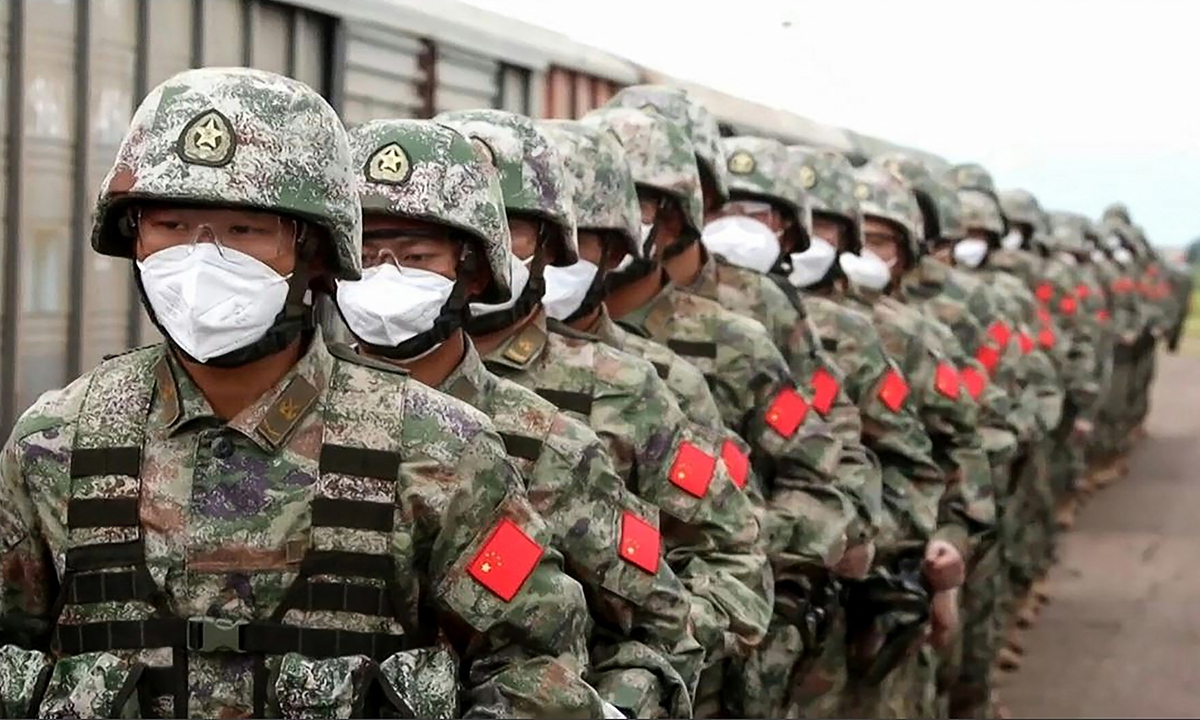
This screen grab, obtained from a handout video released by the Russian Defence Ministry on August 29, 2022, shows Chinese PLA soldiers upon their arrival for "Vostok-2022" military exercises at the Sergeevsky training ground at Primorskiy (Maritime) Kray of the Russian Far East. Photo: AFP
The Vostok 2022 military exercises will be held September 1-7 in the Russian Eastern Military District. Thirteen countries including China, India, Belarus, Mongolia and Algeria are invited to send troops to participate in the exercises. It's also the first time China has sent its Army, Navy and Air Force at the same time to an exercise. Against the backdrop of regional conflicts, the Vostok drills, held in every four years, will be "closely watched" by the US and Western public opinion, which particularized China among the many participating countries, claiming that Washington has been expressing concern about the "warming ties" between China and Russia, and even exaggeratedly branded the China-Russia cooperation "undermining global security."
Probably unable to find "proof of guilt" even with the help of magnifying glasses, US and Western public opinion relies almost entirely on speculation to try to "incriminate" China. For example, many media have even hyped that Russia may intervene in the Taiwan Straits just because China and Russia will this time train in the Sea of Japan. But the irony is that the Abraham Lincoln carrier strike group just had a joint exercise with the Japanese side in the Sea of Japan in April this year, and also made a big deal of claiming to improve the "credibility of conventional deterrence." Isn't it a realistic version of "the authorities can do whatever they like, but the common people are not allowed the slightest bit of freedom?"
This double standard has been taken for granted for a long time. Take the countries participating in the Vostok 2022 drills. Among them, Tajikistan and Mongolia have just finished the "Regional Cooperation 2022" joint exercise with the US, while India is participating in the "Pitch Black 2022" joint military exercise in Australia with the US. For India and other countries to take part in the Vostok 2022 drills, Washington sees it as a "sovereign decision." But when China is mentioned, the US is "surprised." It can be said that the military exercises this time clearly mirror Washington's distorted mentality toward China-Russia relationship.
The ever-strengthening comprehensive strategic partnership of coordination between China and Russia has always been the least thing Washington wants to see. Over the years it has taken many actions overtly and covertly to drive wedges between China and Russia but all failed. After the Russia-Ukraine conflict broke out, Washington began to denounce and sabotage China-Russia cooperation in a simple and rude way, and tried to turn "maintaining friendly relations with Russia" into a new "crime." Under such circumstances, the Chinese ground, naval and air forces going to Russia to participate in the military exercise is likely to arouse deep jealousy from some people in the US and the West. However, China is an independent major power. It's China's right to decide when, where and with whom we will hold exercises in accordance with our own security needs and training arrangements. We do not need to and cannot take cues from others to do so.
Under the new regional security environment, it is necessary for China, Russia and neighboring countries to continue to deepen military cooperation. China-Russia friendly relations have never been a reason for the tension in the Asia-Pacific region, nor has any China-Russia joint military exercise stirred regional situation. Just imagine, if China and Russia, as two neighboring global powers, are suspicious about or confront each other politically and militarily, such a scenario must be an unbearable burden for regional security. Conversely, solid strategic mutual trust between China and Russia as well as fruitful bilateral security cooperation are vital positive assets for regional peace and stability. In contrast, it's Washington's aggressive posture and clamoring for "decoupling" that has caused widespread concern in the Asia-Pacific region.
Regarding the drills, the spokesperson of the Chinese Ministry of National Defense stated that the Chinese side's participation in the exercise aims to deepen pragmatic and friendly cooperation with the armies of participating countries, enhance the level of strategic collaboration among the participating parties, and strengthen the ability to respond to various security threats; and it has nothing to do with the current international and regional situation.
In particular, compared with the joint military exercises which Washington often flaunts as the "largest scale" and in which senior officers take turns emphasizing "deterrence," China-Russia drills are much more low-key in terms of the scale, the number of participating troops, and frequency. We don't need to stage a show to anyone. Washington is particularly nervous about the People's Liberation Army's participation in the military exercises in Russia, which indicates its lack of confidence.
The political imagination of Washington's elites is drying up. Due to the limitations of their visions, it is difficult for them to understand the independent value of China-Russia relations featuring non-alliance,?non-confrontation?and?non-targeting of any third party. And it is even more difficult for them to see the broad space of the new type of major-country relationship. This has made Washington to often overreact to China-US relations like suffering neuroticism: It sometimes exaggerates the "imminent threat" of China-Russia cooperation, while sometimes trying to sow discord between the two countries. But the more actively it does so, the more self-torment it will have to suffer, which will increasingly indicate their ill intentions.




